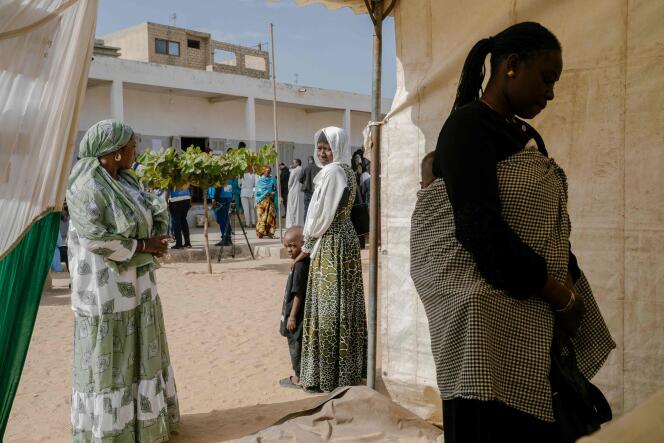


Some arrived at dawn. Fasting for the most part, as Ramadan obliges, there were already almost three hundred of them queuing in the courtyard of the Adja Warath Diène school, in the commune of Gueule Tapée Fass-Colobane, one of Dakar's southern districts. Everyone waited their turn in an almost religious silence, watched by a dozen uniformed police officers. Military personnel stood guard inside classrooms that had been transformed into polling stations. On Sunday, March 24, 7.3 million Senegalese were expected to elect their president, including 707,800 in the capital, the country's main electoral area.
Initially scheduled for February 25, then postponed by President Macky Sall, before being rescheduled several times, the ballot is unprecedented in more ways than one. For the first time since the country's independence in 1960, the incumbent president is not standing as a candidate for his own succession. And with 19 contenders retained by the Constitutional Council – two of whom have withdrawn in recent days but are still on the ballot – the election was exceptionally open.
In the popular locality of Gueule Tapée, many voters expressed their desire for change. For them, the fifth president will have the name Bassirou Diomaye Faye, from the main opposition party, the African Patriots of Senegal for Work, Ethics and Fraternity (Pastef), dissolved in July 2023. With his sovereignist, pan-Africanist rhetoric and his attacks on elites, the CFA franc and multinationals, Faye's positions stand in stark contrast to the continuity advocated by the ruling party's candidate, former prime minister and Sall's successor, Amadou Ba.
"In Senegal, as long as you don't know someone well placed, you have no chance of occupying certain positions even if you have a degree. Macky Sall's regime hasn't changed our lives. We need a radical break," said Sandrine Angela Boissy, a thirty-something executive assistant who has been unemployed for four years. She would be voting for Bassirou Diomaye Faye.
Released from prison under an amnesty law a week after the start of a shortened campaign, the ex-Pastef candidate was riding on the extreme popularity of his party's boss, Ousmane Sonko, who was barred from standing for election following a conviction. Traditionally popular with the under-20s, who make up half the population, 44-year-old Faye could also appeal to parents worried about massive unemployment – estimated at 20%.
In recent years, thousands of young Senegalese have left the country by dugout canoe or by air to make their way clandestinely to Europe or America. "We can't bear to see our children out of work, despite the sacrifices we've made for them. We can no longer afford to feed or look after ourselves. Only young people can bring us this total change. We want to break with the old rulers," insisted Maimouna Dieng, 66, headmistress of a private school.
You have 50.18% of this article left to read. The rest is for subscribers only.
